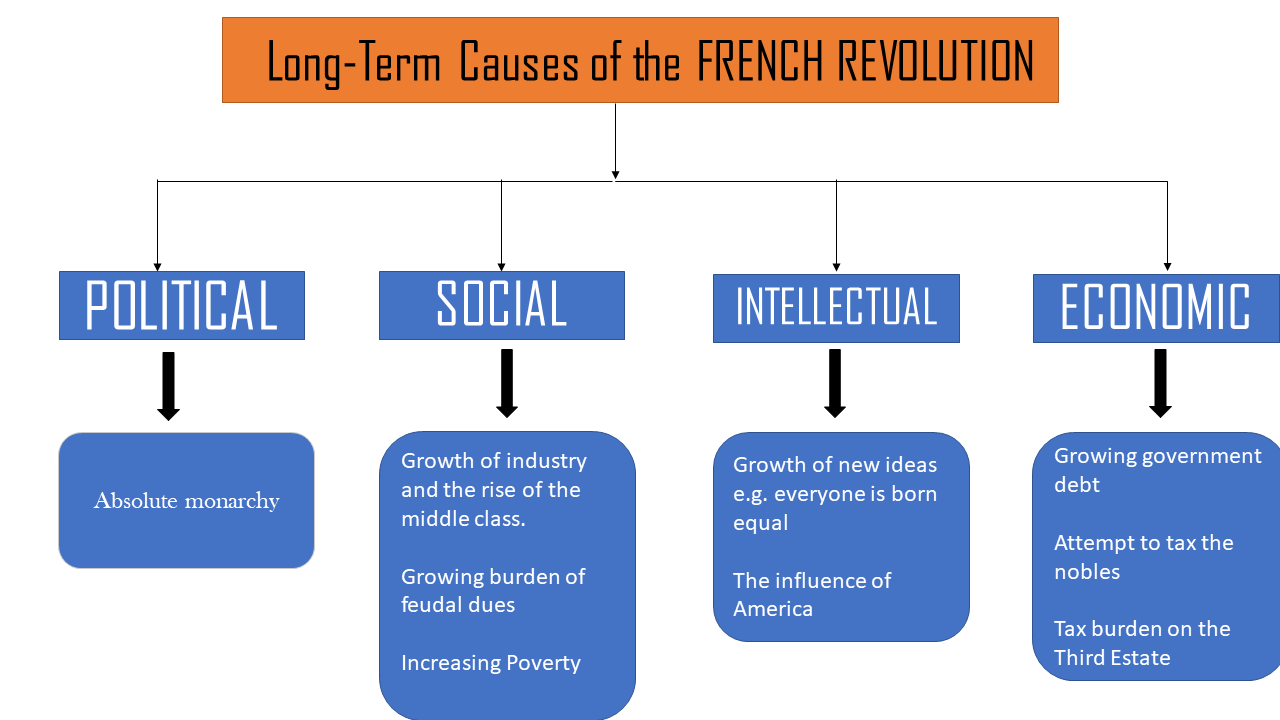Introduction
A fundamental shift in the established social and political system brought about by the actions of a group of disaffected members of society is referred to as a revolution. The sociopolitical system in France was thought to be the root of the problems. This framework was unbalanced, in favour of the upper two estates of society and gave the king absolute power, but denied the common people any basic rights. In the end, the dissatisfied segment of society (third estate) began retaliating against the ruling class, which sparked the French Revolution in 1789.
Reasons for French Revolution
There were many reasons for the French Revolution to take place, some of which are mentioned below-
- Unequal Social Order
French civilization was feudal and had three “Estates”. The first and second estates in France were privileged elites and landowners, but they did not pay any taxes, instead lived at the cost of the third estate. The third estate was the largest community in French society, still they were denied the right to political representation, even though they were subjected to the full weight of taxation. The vast majority of people hence became unhappy and, as a result, caused the French Revolution.
- Rise to Middle Class
Some members of the Third Estate became wealthy as a result of the growth of international trade and business and were referred to as the Middle Class. In addition to professionals and intellectuals, this class also comprised businessmen and industrialists. Although this middle class was influential economically, they were excluded from political representation since they belonged to the third estate. This infuriated them because they believed that a person’s place in society should be determined by his merits rather than any privileges.
- Philosophers and Revolutionary ideas
The writings of eighteenth-century philosophers like Montesquieu, Voltaire, and Rousseau sparked a revolutionary spirit among the French people, especially the educated middle class. They challenged the clergy and members of the church for having excessive power and influence. Philosophers published their thoughts in books and newspapers, which spread the options of liberty and equality among the middle class and led to the French Revolution.
- Economic Crisis
By the second part of the eighteenth century, the French economy was in trouble. The demand for food grains increased as a result of France’s growing population. On the other side, the inability to produce enough food due to famines and droughts increased the cost of goods.
The French exchequer was also already worn down by supporting the opulent lifestyles of King Louis XVI and his wife, as well as the corrupt government officials. Loan providers began requesting payment of funds with a 10% interest rate. The only way to pay off this debt was to raise taxes on the third estate, which brought anger to that estate and propelled the thought of revolution.
- Autocratic Monarchy and corrupt Administration
People were obliged to start the revolution in France as a result of the monarchy and the government’s combined failure. The monarch insisted that he had the power to rule by divine right and that ordinary people had no place in the decision-making process. And the king gave little thought to the well-being of his subjects, and the corrupt and self-centred royal administrators were more focused on lining their wallets rather than thinking of the benefit of the commoners. People did not trust the governing system and hence led to the revolution.
- Influence of the American Revolution
The French people were motivated to rebel against the unfair control of their nation’s absolute monarchy by the achievement of the Americans in freeing themselves from British domination. Even a few military generals from France took part in the American War of Independence. They brought revolutionary ideas with them when they returned to France, urging people to fight for their rights. This led to the French Revolution.

Summary
The word ‘revolution’ refers to a change in the established social and political structure due to the efforts of the neglected section of society. France’s sociopolitical landscape during the French Revolution of 1789 was completely disrupted by the members of the Third Estate. The existing population was unhappy for a variety of reasons such as inequality, economic crisis, autocratic monarchy etc. which led to the start of the revolution in 1789. This revolution not only affected French society and politics but also impacted the trajectory of human history.
Frequently Asked Questions
Q1. How did the Third Estate respond to the circumstances in France at the time?
Ans: The third estate rejected the voting system that gave each state one vote, during May 1789’s Estate General’s meeting regarding France’s financial issues. They wanted the voting based on the number of members. Hence, they took revolutionary action by declaring themselves a National Assembly to ensure their representation, which launched the Revolution in June 1789.
Q2. What do you mean when you say that kingship has a divine right?
Ans: The idea that the monarch’s authority to reign comes directly from God’s will, not through the approval of the population, is known as the “divine right of kingship.”
Q3. What historical changes resulted from the French Revolution?
Ans: The French Revolution not only changed the sociopolitical landscape of France, but it also served as an inspiration for many other nations to defend their national interests. In the end, it helped to foster a sense of national awareness that opened the way for national movements around the world.

